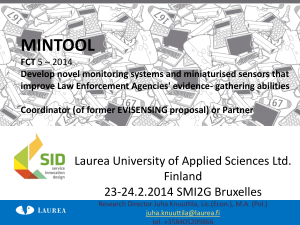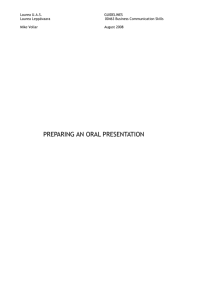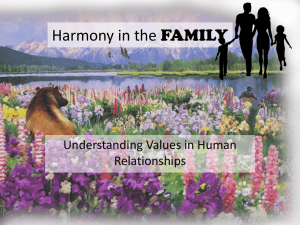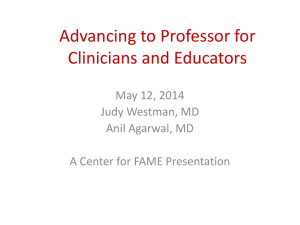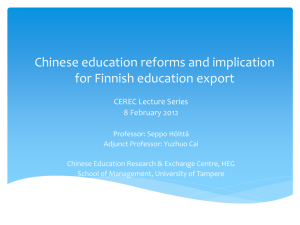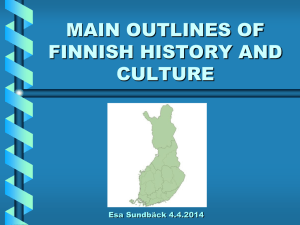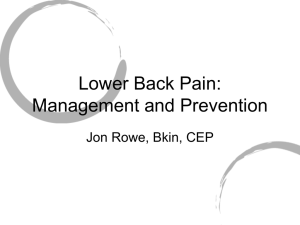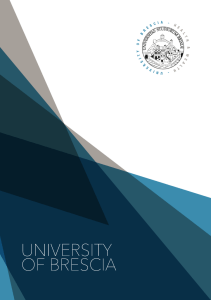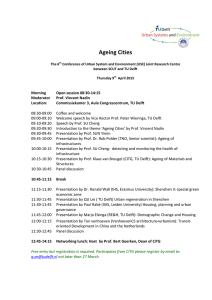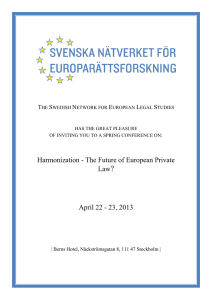Competence development
advertisement
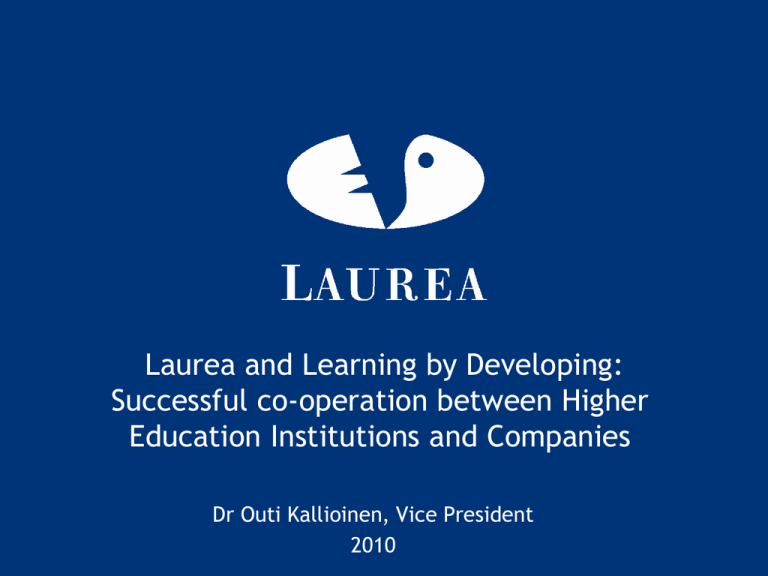
Laurea and Learning by Developing: Successful co-operation between Higher Education Institutions and Companies Dr Outi Kallioinen, Vice President 2010 DESCRIPTION OF FINNISH HIGHER EDUCATION DEGREES Universities academically oriented Degrees of 3rd Cycle Universities of Applied Sciences professionally oriented Doctoral degree (can include a licentiate degree) Degrees of 2nd Cycle Master’s degree Master’s degree Work experience Degrees of 1st Cycle Bachelor’s degree Bachelor’s degree At least 3 years lasting degree on upper secondary level Source: Ministry of Education. Report 2005:4. FINNISH HIGHER EDUCATION IN NUMBERS 2004 Source: Education in Finland, Statistics Finland UNIVERSITIES UNIVERSITIES OF APPLIED SCIENCES 174 000 students 132 000 students 21 000 new students 37 000 new students 4.3% discontinued studies 6.3% discontinued studies 18 000 degrees, of which 1400 doctors 21 000 degrees 4700 foreign students (2.7%) 3800 foreign students (2.9%) expenditure/student 9000 € expenditure/student 6000 € LAUREA UNIVERSITY OF APPLIED SCIENCES Laurea is located in the heart of Finland’s business and cultural life, the area of surrounding capital city Helsinki. Twenty percent of Finland’s population of 5.2 million lives in the area. Laurea has 7 local units in Helsinki metropolitan region. Each unit has been profiled in order to anticipate and meet the challenges of the rapidly developing working life of its area. Laurea’s values as a heartbeat Sense of community Student Creativity Social responsibility Laurea is multidisciplinary Fields of Study: • Natural Sciences • Hospitality Management • Social Services, Health and Sports • Social Sciences, Business and Administration International Advisory Board Started in 2009 Supports and strengthens Laurea’s strategy work and internationalization Members: • • • • • • • • • Prof. Alan Barrell, Cambridge University Dr. Katalin Illes, Anglia Ruskin University Prof. Rolf Stumpf, Nelson Mandela University Prof. Kenneth Smith, University of Arizona Prof. Koichi Ogasawara, Tohoku Fukushi University Prof. Henrique Diz, University of Aveiro Modern learning methods at Laurea • Nominated by Finnish Higher Education Evaluation Council as Centre of Excellence in education: • 2005 – 2006 Learning by Developing, 2008-2009 Security Management 2010-2012 Student-centered r&d integrated in learning • • • Centre of Excellence in Regional Development 2003 – 2004, 20062007: Close interaction with the surrounding region and working life - Good employment opportunities Learning by Developing Integration of pedagogy, r&d and regional development Transformative teaching Competence-based curriculum 2006 -> Integrative learning environments as innovation platforms Learning by Developing at Laurea 1/4 • • • The pedagogical framework for learning in Laurea, developed bottom-up by the staff since late 1990s, is called Learning by Developing (LbD) which is based on authenticity, partnership, experiential learning, research and creativity. Students' learning is related to development projects that are genuinely rooted in the world of work and the students are involved in these projects from the beginning of their studies. According to Laurea’s pedagogical strategy students are treated as junior colleagues. This places lecturers in an entirely new situation and creates tension for pedagogical leadership. Learning by Developing 2/4 • • • • • In LbD answers and solutions are systematically co-created for problems/challenges in which new competence is required. In LbD model the activity starts from innovation/idea or from some specific objective, which means that learning focuses on genuine development of the working world. Learning has a clear mutually (between student, teacher, working life partner) defined objective and takes place through the process of generating new competence. In the LbD-model the regional competence and knowledge, networks and diverse partnerships are integrated comprehensively to the learning process and studies of the students so that the students really have the possibility to become development-oriented experts of their field -> Curriculum delivery in LbD Learning by Developing 3/4 • • • At Laurea the development projects are authentic, working life -based, processual and applied by nature. They are applied in a sense that during the project new, communitybased knowledge is produced and problems and challenges solved in cocreation. The sole purpose of the development project is not to apply strictly scientific knowledge as such to a practical situation. • produces individual and collective learning, creation of new knowledge, innovations in the form of new products, new working methods, new operating models or transformed working culture. Learning by Developing 4/4 • • • • In the LbD-model the regional competence and knowledge, networks and diverse partnerships are integrated comprehensively to the learning process and studies of the students so that the students really have the possibility to become development-oriented experts of their field. The LbD-model is being constantly developed and it has also been evaluated by an international evaluation team (see more in the report Making a Difference by Vyakarnam, S. et al 2008). International LbD follow-up evaluation 2009 Quality Teaching Review by OECD/IMHE 2010 Intl. evaluation: findings 2008 • • • • • • • • • Strengths of LbD to students: Growth of independent thought Increase in self-confidence Very experiential Early experiences of people relying on you Early experiences of personal responsibility for results and duty to colleagues Equips you to see the whole picture The atmosphere is one of equals Ability to lead people rather than manage events Intl. follow-up evaluation: findings 2009 Evolution of the Definition From “it depends”... to individual definitions of concrete activities A shift from pedagogy to action “The best proof of the success of our pedagogical model is one of the highest rates of employment among graduates in the country.” (Laurea Facts 2009-2010) Competence-building in innovation platforms • • The modern innovation platforms are operated in shared expertise and networks, without forgetting the challenges of leadership. Learning to learn, interaction skills and continuous self-development are some of the key factors in the success of students in their studies and teachers in their work. Centre of Excellence in Education 2010-2012 • • • • Among UAS Laurea was nominated as a Centre of Excellence in Education for 2010-2012 by the Finnish Higher Education Evaluation Council in Nov 2009 The theme of the application was Student-centred R&D integrated in Learning This theme is further development of LbD during the past few years Nationally 31 applications – 8 nominations Student-related results Competence development • Students’ R&D credits (49 057 in 2009 – 6,9 cr/student) Change in learning culture • Learning outside lecture halls 13.4.2015 19 Results in Transformative Teaching Efficiency • • • • • Reaching and exceeding the objectives Fluent and constructive cooperation Exceptional quality in work and attitudes Strong development orientation Satisfaction • • • In large scale Students’ strong experience to be the ones to make success Entrepreneurial spirit • • • • Strong collaborative spirit Commitment to learning, the teacher and the objectives leads to increase in work amount – flow in learning Energy in work LAUREA’S QUALITY ASSURANCE SYSTEM QA system audit October 2010 by FINHEEC
